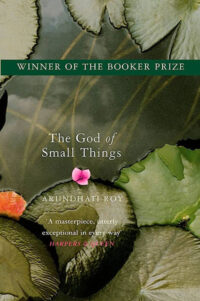Book review: The God of Small Things by Arundhati Roy

I have been hearing praise lavished on this novel since it was first published in the 1990s but somehow The God of Small Things by Arundhati Roy still exceeded my expectations. It goes to some tough, dark places but manages to use a playfulness with language to prevent it from being a tough, dark read.
That same playfulness with language also means that the story initially feels elusive, at a distance, even though most of the facts are given to the reader up front. We start with a 31-year-old woman, Rahel, arriving at her childhood home in Kerala after a long absence. She has come because her twin brother Esthappen has also come back. The only other family member living there now is their aunt Baby Kochamma.
We learn early on that something terrible happened when the twins were 7 and that they haven’t seen each other since. Some of the major details are revealed in the first few pages, while other details are saved to almost the final page. It involved their English cousin Sophie, their mother Ammu, the local Communist leader Comrade Pillai and a local man called Velutha who worked in the family’s pickle factory.
Switching between 1969 and 1993, Roy gradually reveals the facts but she also builds the characters piece by piece. When new details are revealed about a character, that becomes another way to refer to them. For instance, 7-year-old Rahel wears her hair “on top of her head like a fountain” in a “Love-in-Tokyo” hair band, and from then on is sometimes simply referred to as “the fountain” or “Love-in-Tokyo”. This is occasionally confusing but for the most part works well to give something like a child’s point of view to the 1969 sections.
“Centuries telescoped into one evanescent moment. History was wrong-footed, caught off-guard. Sloughed off like an old snakeskin. Its marks, its scars, its wounds from old wars and the walking backwards days all fell away. In its absence it left an aura, a palpable shimmering that was as plain to see as the water in a river or the sun in the sky. As plain to feel as the heat on a hot day or the tug of a fish on a taut line. So obvious that no-one noticed.”
One major theme is social position. The central family in the story are Syrian Christians, which confers on them a slightly odd outsider position in their town. Velutha is a Paravan, or “Untouchable”, which means people beyond his immediate family refuse to touch him and the only work he gets is manual labour. But the twins adore Velutha and spend time with him – a situation that clearly has a time limit. Like others of his caste, Velutha is interested in communism, which promises to open up his world. But when push comes to shove, will the Communist Party stand by him?
Roy subtly contrasts the widely held fears about Untouchables and Communism with actual violence perpetrated by family members and “respectable” strangers. She is also making a point about women’s place in society. Ammu divorced her husband after he physically abused her, but she is considered not quite respectable for leaving him. Her brother Chacko is also divorced but he doesn’t suffer the same gossip she does.
The 1993 chapters are more contemplative, focusing on Rahel finally piecing together what really happened now that she can view the past through adult eyes. She comes to realise the emotional toll the events had on everyone involved, and where the fault actually lies. But mostly she moves slowly around the house and village, observing her brother and ignoring her aunt.
The whole book has a slightly dreamlike quality, possibly due to the lyrical language distancing me a little, which had the effect of making the terrible events, when they happen, both shocking and almost unreal. For me that felt like a good reflection of how the children would have experienced the events.
“Years later, on a crisp fall morning in upstate New York, on a Sunday train from Grand Central to Croton Harmon, it suddenly came back to Rahel. That expression on Ammu’s face. Like a rogue piece in a puzzle. Like a question mark that drifted through the pages of a book and never settled at the end of a sentence. That hard marble look in Ammu’s eyes. The glisten of perspiration on her upper lip. And the chill of that sudden, hurt silence.”
I think Roy does a great job overall of getting under the skin of what it is like to be seven years old. The twins can change their focus suddenly and often, but they can also hyper focus and zone out the rest of the world. Roy demonstrates where this apparent contradiction comes from. The twins are constantly being given mixed messages about how to behave. They can be easily hurt or confused by words said unthinkingly.
This failure of people to foresee the consequences of their words telescopes from tiny moments to unthinkable tragedy. It’s brilliantly structured and gorgeously written.
The God of Small Things won the Booker Prize in 1997. Roy has been writing journalism and non-fiction books since, but her only other novel is The Ministry of Utmost Happiness published in 2017. That is most definitely going on my to-read list.
Published 1997 by HarperCollins.
Source: Borrowed from a colleague.
One Comments
Comments are closed.